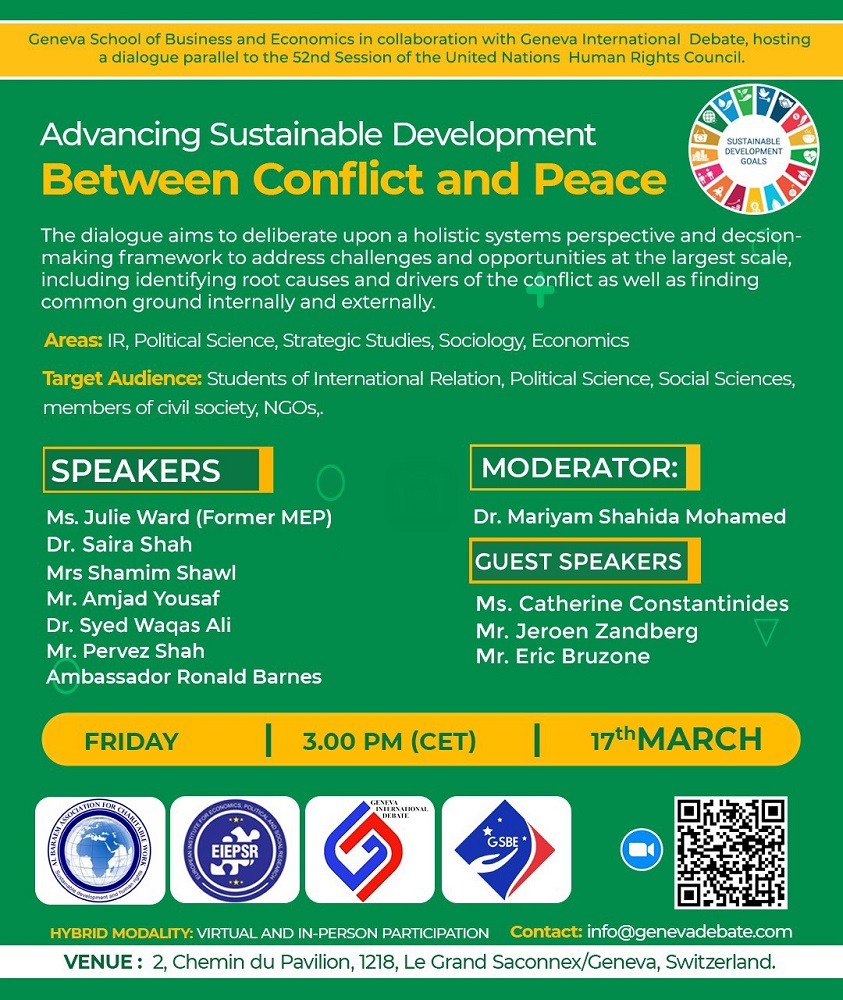On 17 March 2023, Geneva School of Business and Economics in collaboration with Geneva International Debate organised a conference on sustainable development. Below is a speech delivered by Mr. Jeroen Zandberg:
Thank you for inviting me to participate in this conference.
The issues that this conference addresses are urgent, complex and interdependent. In this brief presentation, I want to highlight this complexity.
Corporate responsibility
I want to start with corporate responsibility, which is becoming ever more institutionalized and international. One example is a concept law called ‘International corporate responsibility’ that was presented by numerous political parties to the Dutch government in January of this year [2023]. According to this law, multinational corporations would be responsible for the entire production and logistical chain of their products and services, including the activities from their suppliers. It would ban forced and child labor, modern slavery and environmental degradation and would make the multinationals responsible and accountable. The ‘International corporate responsibility’ law would enable the Dutch court to hold multinational companies accountable for any human rights abuses and damages to the environment done by their suppliers. On the one hand it is positive that people are held accountable for wrongdoings. However, it also gives multinational companies and national courts more leverage and power over smaller companies in Africa and Asia to comply with the rules set in the Netherlands. An increase in protection could thereby also lead to a decrease in freedom and make it harder for economically less developed regions to become competitive and economically independent.
Energy transition
The world is in the process of an energy transition from fossil fuels, like oil and gas, to renewable energy sources, like solar and wind power. These new energy sources require raw materials like cobalt, nickel and copper to build the batteries that power the new economy. These materials are located in just a few countries, like Indonesia and the Congo.
Congo – Katanga
I want to focus on the Central-African country of Congo, and more specifically its southeastern province of Katanga that holds many of the earth’s riches. For example, Katanga has more cobalt in its soil than the entire planet combined. This makes the region crucial for a new economy built around renewable energy. Currently, the mines in Katanga provide much of the world’s cobalt, yet the costs of mining are great, both in human and environmental costs. However, the resources are crucial for the modern economy.
Great power competition
Therefore, there is great interest by the technologically and economically dominant countries to control the supply of these resources. Katanga thereby stands on the crossroads of the great power competition between the US, China, Europe and other upcoming large nations, like India, and regional blocs. The Chinese invested heavily in Katanga in the past years. The mining is for a large part controlled by Chinese companies, which guarantees China access to a critical part of the new global economy. Other great powers also try to guarantee the supply of critical raw materials. For example, the European Commission presented its ‘European Critical Raw Materials Act’ yesterday, [16 March 2023]. This proposal lists a set of strategic raw materials that the EU needs access to, in order to remain competitive. The Act sets out how to mitigate risks and control the supply of these materials.
Fragile borders
Besides this scramble for dominance by the great powers in the world, there is also an often-overlooked political issue, namely the fact that Katanga is a region within the Congo that has a distinct identity and history. Katanga was integrated in the Belgian Congo in 1914 by the Belgian colonizers. When Congo became independent from Belgium in 1960, Katanga also declared itself independent as a separate state. Katanga was subsequently a sovereign nation until 1963 when it was militarily defeated and made part of the independent state of Congo. Up to this day, there are groups that claim to represent Katanga and strive for self-determination. They try to rally people behind their cause and have a wide array of grievances they can tap into; from economic exploitation, lack of political representation and environmental destruction.
Conclusion
I want to conclude this brief introduction with summarizing the complexity that is part of sustainable development. Any effective policy needs to find a balance between corporate responsibility, control over vital resources, great power competition and regional self-determination. I look forward to hearing the contributions from the speakers of the conference on how they see the challenges around sustainable development and conflict prevention.
Thank you,
Jeroen Zandberg
17 March 2023
